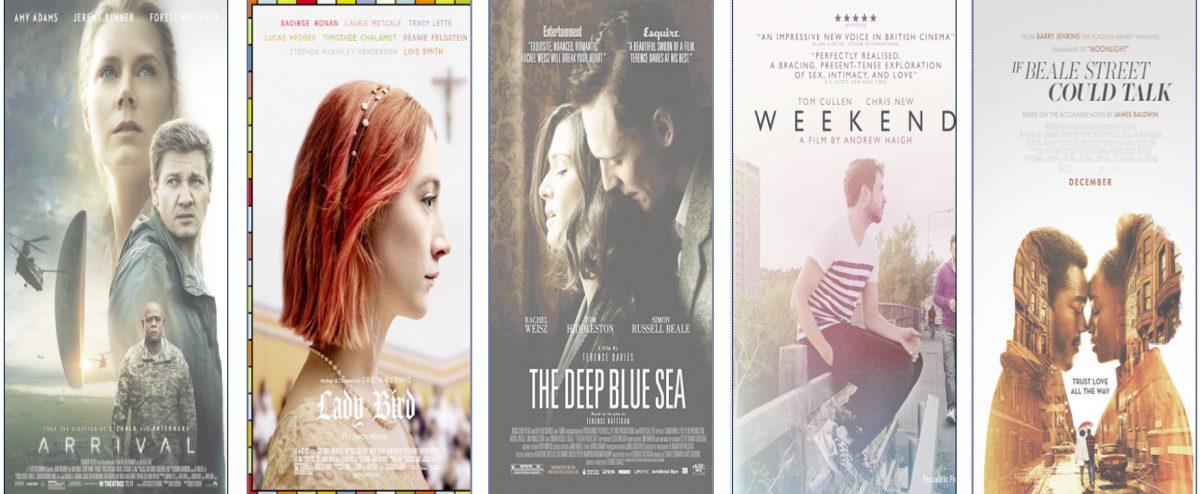There’s a strange duality that comes with writing about films as a job. You seek out films, mentally writing your opening paragraph sometimes halfway through watching, in a way that feels counterintuitive to letting go and enjoying it. But you always watch every new movie hoping that it leaves you with something to hold on to forever. Maybe you’re not expecting it to change your life, but you’d be happy if it did.
“Change your life” is a tall order to put on any film, and it’s a risky lens to measure the best films of the decade through but it’s the lens that feels most honest. Isn’t that how we think about the pieces of art that we cling most to? Their existence in our life feels essential, as if we would be different without them. And, so this list of fifteen great films from 2010-2019 is absurdly subjective. But, it’s also a very unusual list of films from the last ten years that stand for something – artistically, aesthetically, culturally, politically. The top seven films are the ones that I cannot argue against, the seven that most stick out. The other eight might be replaced by another eight, or another eight, but each of them have stuck with me since I first saw them. We’ve been privy to many different things in the last ten years of film and this list rather than comprehensive assessment of the years offered, presents a limited perspective of some of what the decade in film argued for – from world-changing crises, to myopic personal failings. These 15 offer a perspective on the very best.
#15 “Anna Karenina” (UK: 2012, Dir. Joe Wright)
The battle between illusion and reality will always be the most fascinating thing about cinema. The dichotomy is almost always like a trick. What’s real? What’s not? And what’s in that liminal in-between space? Beyond the push and pull of truth and illusion, “Anna Karenina” is a gloriously messy sprawl of a film. How could it not be? It tries to whittle a gargantuan novel down to a two-hour film and it doesn’t work seamlessly but it never fails to fascinate me. In a decade of risky literary adaptation, few things feel as risky as the chaotic frenzy that Joe Wright works this film into. It has a verve of feeling and a depth of meaning that make it prickly and frustrating but dense and thoughtful. It makes me think in a way only a great film can.
#14 “Once Upon a Time in Anatolia”
(Turkey: 2011, Dir. Nuri Bilge Ceylan)
Like “Anna Karenina,” the way that Ceylan pulls this film together is one that favours sprawl over concision. It announces itself as a murder-mystery except it is not really about a murder and not satisfying as a mystery. A group of men gather one evening in search of the buried body of a murder victim, but the murder becomes secondary to the way these men interact with each other and the ruinations they have on human life. This is very deliberate, unsubtle stuff but there’s a precision and care to the imaging and rendering of emotion here that stands with the most moving pieces of this decade. Like “Anna Karenina” even when “Anatolia” confounds and frustrates, it remains imprinted in my memory in a way that I can’t let it go.
#13 “A Separation” (Iran: 2011, Dir. Asghar Farhadi)
Every act of Farhadi’s tale of a marriage coming apart at its seams, feels like it’s pulling the rug out from under you. “A Separation” is sad and desperate in a way that feels too painful to bear, because the issues at stake feel too deeply personal. That Farhadi gives such respect and care to the domestic issues of these characters, that he never condescends to them or relegates their harsh unpredictability to symbols but keeps them rooted in empathy and realness is the miracle that this film sustains. “A Separation” matches a number of the films on this list in the way it argues for the value of the small things, and the way that small things build up to become insurmountable.
#12 “The Way He Looks” (Brazil: 2014, Dir. Daniel Ribeiro)
It’s one of two films about teenagers on the list, and there’s a slightness to the things at stake here that always make “The Way He Looks” feel so small, especially the way that Ribeiro is always turning his camera inwards – the film doesn’t place these characters within the context of the country they’re in, or even the world. But, how do you try to make sense of the waves of feeling precipitated by something as mundane as the way the light shines on a character as he takes a bike-ride with the object of his affection? “The Way He Looks” is small, but its ideas of disability, gay-teenage love, and friendship are poignant. Its sweetness and tenderness feel at odds with the bleakness of the last decade, which is why it feels so out-of-place, but still essential on this list.
#11 “Portrait of a Lady on Fire”
(France: 2019, Dir. Céline Sciamma)
As the most recent film on the list, I’m excited to revisit Sciamma’s period romance to reconsider the ways that it has lingered in my memory. I suspect the way it lingers will only deepen on a second visit, for this is a story of a love that also lingers. What sticks out beyond anything in “Portrait” is the way that Sciamma values women – as artists, as lovers, as friends, as truth-seekers, as truth-tellers, as suffer. It does not take its title lightly, so each frame is as ornate and tender as a painting, but it is not mere beauty without a cause but instead punctuated by sincere earnestness and care.
#10 “Arrival”
(USA: 2016, Dir. Denis Villeneuve)
“Arrival” understands how hope is almost always tinged with dread. How our desire for company is always underscored by or fear of loneliness. And how the certainty we come to about life and our place in it, is only borne out of the dizzying paranoia of the world’s chaos. When aliens arrive in Villeneuve’s melancholy sci-fi film, the results are not what you anticipate. Instead, of a fight for world dominance, “Arrival” turns into an appraisal of the frailties and possibilities of humanity. Thematically, it is the most hopeful film on this list. In “Arrival” communication is the key to survival and legacy – the thing that makes humanity worth saving is the dogged commitment to seeing a thing through, and Amy Adams’ Dr Louise Bennett is an ideal symbol for this.
#9 “Lady Bird” (USA: 2017, Dir. Greta Gerwig)
“Lady Bird” grew on me. And, I suspect, that is its intention. It’s performing this trick of seeming like something so slight and straightforward except it keeps deepening and shifting what it means and what it’s about from scene to scene. It’s not the film of the decade I would expect to be so confounding, and yet years later I’m not quite sure I’ve figured out all the possibilities of meaning that the film proposes. That’s an exciting way to think of a debut feature, and there’s not a single false note in this. Not Saoirse Ronan’s well-modulated performance, not the sharp script, not the supporting ensemble (best in show, a moving Lucas Hedges), and not that ending – ambiguous, and unsettling. Sad, but happy. “Lady Bird” is marvel.
#8 “The Deep Blue Sea”
(UK: 2011, Dir. Terence Davies)
In post-war London, a woman decides to kill herself one morning, realising that the youngfer man she left her much older husband for is no longer in love with her. Her despair is myopic and even petty. Late in the film her estranged husband visits to mourn her unsuccessful fate. “This is a tragedy,” he insists. She considers him and replies, “Sad, perhaps, but hardly Sophocles.” That moment gets to the quick of how “The Deep Blue Sea” understands itself and the world it creates so effectively. Davies is achingly aware of the tininess of our protagonist’s plight. Why does this woman’s foolish despair matter? Yet, he insists we pay attention. Rachel Weisz’s unrelenting performance demands that we look beyond the superficial pettiness to the person clinging, desperately, to life beneath. Cinema can whittle the big themes of life down to the size of a movie screen, but it can also turn the tiny human foibles that beset us all into big things that are worthy of attention. That’s what “The Deep Blue Sea” does, it takes a little thing about a little woman and by the end shocks you by revealing how the little things can overwhelm you.
The Seven Best Films of the Decade
#7 “Weekend” (UK: 2011, Dir. Andrew Haigh)
No film has been as clear-eyed in its romance this past decade as “Weekend,” even as the film resists the idea of itself as a romance, rather working as an accidental meeting of two kindred spirits at crossroads. It’s hard to shake the modest tenderness of the way Andrew Haigh modulates the mood in “Weekend”, building slowly throughout to an emotional crescendo by the end. Haigh’s depiction of queer intimacy is immediately essential to the 2010s, but his observations on city-life, masculinity and loneliness are just as astute. Amidst the bigger films on this list, “Weekend” and its £120,000 budget stick out but the wealth of emotion and sincerity on display match any film on this list.
# 6 “If Beale Street Could Talk”
(USA: 2018, Dir. Barry Jenkins)
This is the best American political film of the decade, if you care enough to pay attention. “If Beale Street Could Talk” is a lesson in how period aesthetics can work to deepen and subvert the contemporary themes of a film. Barry Jenkins is in conversation with James Baldwin as the film seems to be looking backwards and forwards: America, then – America, now. In is novel, Baldwin was arguing that Black Lives Matter long before it became a slogan of Black America, and here Jenkins understands that experience for the joy and for the pain. So “Beale Street” is beautiful and sad, hopeful and heartrending. Each frame is a picture, and each moment is a challenge. It is a film that overwhelms, but beyond that it is a staunch call to arms for empathy – see these people and believe that they matter.
#5 “Inside Llewyn Davis” (USA/France: 2013, Dir. Joel and Ethan Coen)
By the time the last decade began, I had resigned myself to respecting and appreciating but never loving a Coen Brothers film. Then “Inside Llewyn Davis” hit me like a runaway train. There’s a line late in the film, when Llewyn returns from his unsuccessful odyssey for artistic success to bother his ex-girlfriend. She enquires to his state. “I just need a place to dump my stuff. I’m tired of dragging it all around with me,” he says. I think about that moment a lot. It feels like the line of the decade – an honest reckoning of the ways we all are weighed down by the baggage we carry with us. Even if Llewyn is an unlikely hero, he’s selfish, prickly, antagonistic–his sadness and desperation feel terrifyingly familiar and potent. The Coen Brothers have never been as tender or empathetic as they are here. Oscar Isaac has never been as moving. The sadness of the film seeps out from every pore, from the plaintive music to Bruno Delbonnel’s hazy and gorgeous cinematography. This world is sad and pessimistic and full of despair and yet at the end of painful journey Llewyn Davis and “Inside Llewyn Davis” seem to be reaching out for some vestiges of hope. Against all logic.
# 4 “Roma” (Mexico: 2018, Dir. Alfonso Cuarón)
The pristine black-and-white cinematography of “Roma” is one of the most effective bits of cinematic misdirection of the decade. The film looks like an austere memory even as Cuarón deftly subverts his own aesthetic to force us to take in the complexity of this world where nothing is idealistic as it looks. “Roma”, for all the simplistic readings it has invoked, is essential class-conscious cinema with a decisive postcolonial shift that is always doing more complex things than isolated moments might suggest. If the decade has been short on empathy culturally and politically in the real world, then “Roma” offers us that missing empathy in dividends. Of course, it matters that the wealth of empathy Cuarón has can only be mustered up when looking back at the past. Those living through the past are too consumed with their own affairs to find it. Hindsight is, after all, 20/20. So, Roma lays bare the best and worst of our good intentions, the way we ignore those who care for us and the way class, race and gender intersect and diverge, leaving some fated to be forgotten.
# 3 “No” (Chile: 2012, Dir. Pablo Larraín)
Pablo Larraín is my pick for director of the decade. No director has been as consistently daring in exploring the varying possibilities of cinema, and I’m excited to watch him grow in the 2020s. What’s weird thinking about “No” eight years after its release is the way it seems less strange and ambitious because of what Larraín has done, since. Yet, this tiny Chilean film feels Herculean and essential still In 1988 after 15 years of military dictatorship and international pressure, dictator General Augusto Pinochet is allowing a national plebiscite where the citizens will vote “No” or “Yes” to decide whether he should remain in power for eight years more. René Saavedra (a note-perfect Gael García Bernal) is hired by the “No” proponents to run their ad-campaign. Rene does not care about politics. His employers do not care for theatrics. Between them, they work to overthrow a government. “No”, in theory, is straightforward. In actuality, it is a weird mix of historical drama, advertising comedy, political critique and stylistic wonder. This is daring stuff. From the aesthetics (Larraín shoots in ¾ inch Sony U-matic magnetic tape, imitating the television style of the 80s) to the modulation of tone and the merging of fact and fiction, “No” resists singularity at every turn. When I think of how cinema is inherently false but with an astonishing capacity to reveal truths, “No” serves as a shrewd emblem of this possibility.
# 2“Silence” (USA/Taiwan: 2016, Dir. Martin Scorsese)
I first saw “Silence” in the evening of January 1st in 2017. I remember sitting in the theatre as the credits rolled and the audience milled out around me, and I remember the exact feeling of despair that overcame me. I felt as if I had been pulverised. No experience at the movies this decade has stuck with me as clearly. It’s a strange way to begin a recommendation for “best” of the decade, and yet it’s apt. “Silence” is not for the faint of heart, but it is essential work. It’s a film writ large about faith, and about Catholicism specifically. It’s too full-throated about god for many atheistic audiences, and too ambivalent about Christ for the very religious but even beyond the monotheism of Christianity, Scorsese presents a larger metaphor about the uncertainty of keeping faith in anything we hold dear. Years later it feels like a prescient indictment of the way the decade ended. It’s thoughtful, unpredictable, intelligent, beautiful stuff that demands so much from the audience but it rewards our faith in cinema with rewarding sincerity of feeling.
The Best Film of the 2010s
# 1 “Certified Copy” (Iran/France: 2010, Abbas Dir. Kiarostami)
“Certified Copy” is a sly trick of a movie, and a trick of a choice. It’s more a puzzle than a movie, except it’s a puzzle that doesn’t want you to figure it out. It is a glorified philosophical discussion of the merits of the authentic versus the artificial. It is also a rumination on what it means to be married, and to be alone. It is a self-aware riff on the pointlessness of trying to figure out what’s real. It is all these things, while being a playful and tender piece of art on the way that our emotions and hopes are whittled down by time. More important than the things I’ve described, it is also a film that opens up new interpretations each time I see it. Many of the most assiduous of film fans will still call “Certified Copy” minor in the oeuvre of Abbas Kiarostami’s daring and thoughtful filmography, but no film represents the possibilities of the medium as earnestly as this one can and does. Kiarostami directs Juliette Binoche to the performance of the decade in a film that is provocative, daring, risky and rewarding. It’s the magic of movies.











